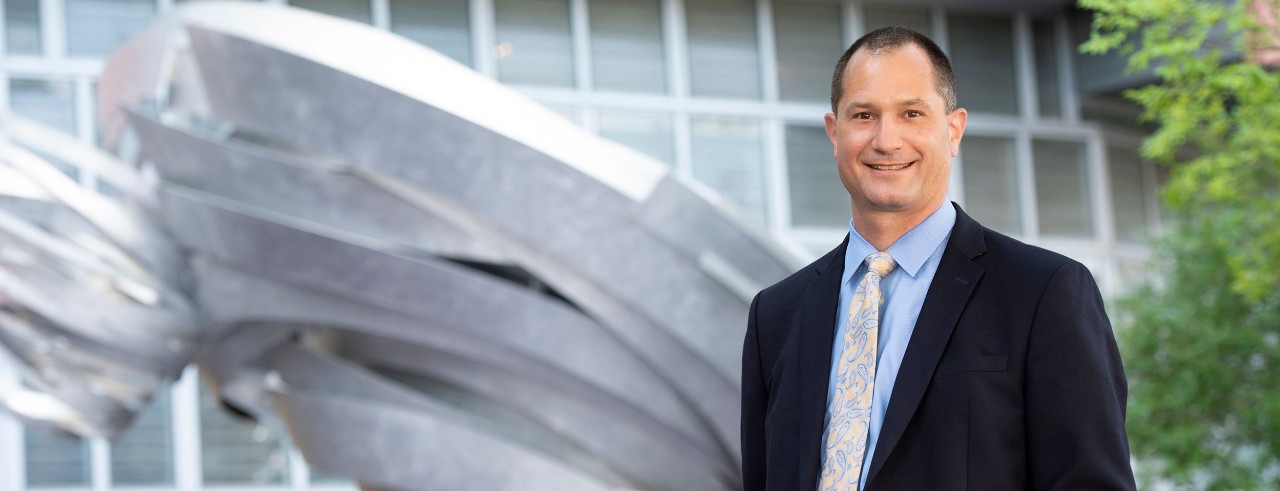
UC Answers: How are UC researchers tackling COVID-19?
Associate dean discusses efforts by UC researchers to combat the coronavirus
“The only way out of the COVID-19 global pandemic is through science,” says Brett Kissela, MD, senior associate dean for clinical research at the University of Cincinnati College of Medicine and chief of research services at UC Health.
UC researchers are playing a major part, working around the clock to study the coronavirus — from transmission to treatment and beyond — with hopes of ending the pandemic sooner than later.
In addition to conducting both basic science and clinical research, these scientists are also training the next generation of research pioneers, allowing them to actively participate and make their own mark during a global health event that will undoubtedly change the future of the field and public health as we know it.
How is UC leading the way during this global pandemic?
"The only way out of the COVID-19 global pandemic is through science. We need better prevention. We need treatments. We need vaccines. And we need testing. At the University of Cincinnati and the College of Medicine, we're researching all aspects of those areas to try and defeat COVID-19. We are conducting research that starts with basic science and understanding the biology of the COVID-19 virus but are also looking at the clinical manifestations of the virus and how to treat patients who are infected as well as ways to keep the population from getting sick."
How will this event shape medical research moving forward?
"COVID-19 has been a worldwide threat as a pandemic. We've seen scientists coming together across the United States — across the globe, really — working together to solve this problem with science. I think in the future we're going to find ways to better focus on major existing health problems like cancer, stroke and dementia, and I think we'll learn techniques that will improve our ability to solve these problems. I know at the University of Cincinnati, we'll be involved in these collaborations. We're very excited to be part of finding the solution for COVID-19, and we look forward to making major contributions across the spectrum of this and all diseases."
What major research contributions to the pandemic are UC scientists making?
"We’re very excited for an upcoming vaccine trial, the first major trial to hit Cincinnati in a later phase in which we hope to find a vaccine that will be effective against COVID-19. We're also excited about some upcoming trials to investigate treatment of patients infected with COVID-19 and prevention of the disease. Finally, we’re doing some important research engaging the community to understand how behaviors might lead to the spread of the virus — for example, understanding factors involving facial coverings for prevention and ways the virus impacts people from underrepresented populations."
How are students and postdoctoral trainees involved in this work?
"Across the university, and especially at the College of Medicine, we've seen labs from all different disciplines coming together to study COVID-19. Labs that weren't related to infectious diseases and viruses before the pandemic are now studying COVID-19 or the related impact of COVID-19 on systems in the body. We're definitely seeing our students and graduate students pulled into an understanding of how to collaborate in a time of an international emergency and really use science as a tool to help get us out of it."
Why is participating in clinical trials for COVID-19 so important?
"As we bring these trials forward, especially for prevention strategies like vaccines, I would encourage everyone to consider being a part of it. I've signed up. This is our opportunity to see if we can find a way to help prevent COVID-19. When you're in a clinical trial, you're not only taking the opportunity to potentially have early access to something beneficial for yourself, but you're helping the rest of the world by assisting scientists in learning about what works and what does not work."
Featured photo of Brett Kissela, MD, taken by Colleen Kelley/UC Creative + Brand.
Participate in a clinical trial
If you are interested in being contacted in the future about a COVID-19 vaccine trial, please complete this brief survey. Study teams will be reaching out to eligible participants with more information during the enrollment process. For information on other studies, email UCcovidresearch@uchealth.com.
Related Stories
ChemoID test leads to better outcomes in platinum-resistant...
April 7, 2025
MSN and MSN UK highlighted results from a new Phase 3 trial published in the journal npj Precision Oncology that found a cancer stem cell test can accurately choose more effective treatments and lead to improved outcomes for patients with platinum-resistant ovarian cancer.
OTR mural celebrates UC alumni success
April 4, 2025
The UC Alumni Association, UCAA, will mark its annual Alumni Celebration during its upcoming Alumni Week, April 7-13, with a community art project commemorating this year’s slate of alumni honorees receiving the organization’s top awards.
Study: Platform-predicted treatments improve outcomes for...
April 4, 2025
Results from a new Phase 3 trial published in the journal npj Precision Oncology found that an assay that includes an assessment of cancer stem cell sensitivity to chemotherapy can accurately decide more effective treatments and lead to increased outcomes for patients with platinum-resistant ovarian cancer.
